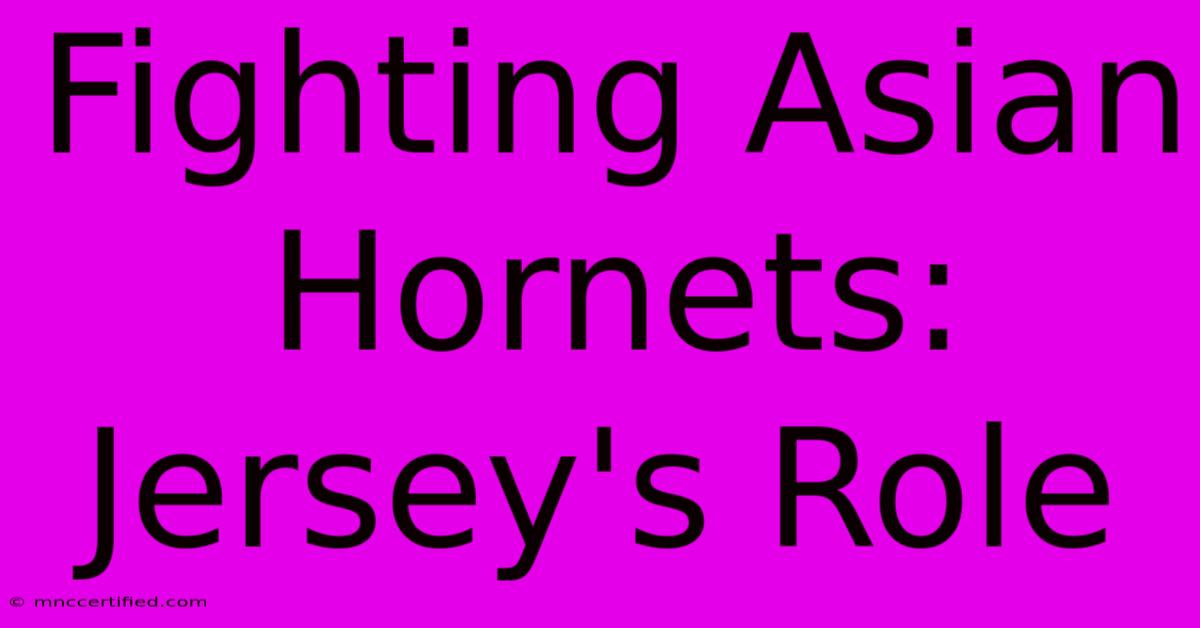Fighting Asian Hornets: Jersey's Role

Table of Contents
Fighting Asian Hornets: Jersey's Role in a Global Battle
The Asian hornet ( Vespa velutina ) poses a significant threat to biodiversity and the livelihoods of beekeepers, and the Channel Island of Jersey has become a frontline in the fight against its spread. This article explores Jersey's crucial role in combating this invasive species and highlights the strategies employed to protect its unique ecosystem and agricultural sector.
The Threat of the Asian Hornet
The Asian hornet isn't just a nuisance; it's a highly invasive predator. Its primary prey are honeybees, devastating local populations and impacting honey production. This predatory behaviour threatens the pollination of crops and wildflowers, impacting both agricultural yields and the wider ecosystem. Unlike native hornets, the Asian hornet's aggressive nature and venomous sting also pose a risk to humans, although fatalities are rare.
Why Jersey is a Key Battleground
Jersey's geographical location – an island close to mainland Europe – makes it particularly vulnerable to invasive species arriving from France. Its relatively small size, however, also provides an advantage: a contained environment makes effective control measures more feasible than on larger landmasses. The island's proactive approach and well-organized response have made it a case study for other regions facing the same challenge.
Jersey's Strategies in Combating the Asian Hornet
Jersey's fight against the Asian hornet is multi-pronged, relying on a combination of early detection, swift eradication, and public awareness campaigns.
1. Early Detection and Nest Removal: The Power of Public Participation
The success of Jersey's strategy hinges on early detection. The public plays a vital role in this process. The States of Jersey (the island's government) actively encourages residents to report any suspected Asian hornet sightings through a dedicated hotline and online reporting system. This rapid reporting system enables swift action, with trained teams deploying to locate and destroy nests before they can significantly expand their population.
2. Nest Destruction Techniques: Professional and Targeted
Nest destruction is carried out by trained professionals using a variety of methods, including the use of insecticides and physical removal. The chosen method depends on factors such as the nest's location and size. This targeted approach ensures both effectiveness and minimizes harm to the environment and other beneficial insects.
3. Public Awareness and Education: The Key to Long-Term Success
Jersey's government runs comprehensive public awareness campaigns to educate residents about identifying Asian hornets and the importance of reporting sightings. This education program includes detailed images, videos, and informative materials distributed through various channels, ensuring maximum reach and engagement. Knowing what to look for is crucial to controlling the spread.
4. Collaboration and Research: A Holistic Approach
Jersey's approach is not solely reactive. The island actively collaborates with researchers and other regions facing the same issue, sharing knowledge and best practices. This collaboration is crucial for continuous improvement of control strategies and the development of new, more effective methods. Research on effective and environmentally friendly control methods is also ongoing.
The Long-Term Fight: Maintaining Vigilance
While Jersey has made significant progress in controlling the Asian hornet population, the battle is far from over. Continuous vigilance, public participation, and proactive measures remain crucial to prevent future outbreaks and safeguard the island's unique ecosystem. Maintaining a strong surveillance network and continuing public education are critical to long-term success.
Conclusion: A Model for Other Regions
Jersey's experience demonstrates the importance of a rapid, coordinated, and community-involved approach to tackling invasive species. Its success offers valuable lessons and a potential model for other regions struggling with the Asian hornet or facing similar threats. The island's commitment to proactive measures, public education, and research showcases how a combined effort can significantly mitigate the impact of invasive species. By continuously adapting and improving its strategies, Jersey serves as an inspiring example in the ongoing global battle against the Asian hornet.

Thank you for visiting our website wich cover about Fighting Asian Hornets: Jersey's Role. We hope the information provided has been useful to you. Feel free to contact us if you have any questions or need further assistance. See you next time and dont miss to bookmark.
Featured Posts
-
Morgan Wallen Nashville Chair Verdict
Dec 13, 2024
-
Witcher 4 Ciri Confirmed At Game Awards
Dec 13, 2024
-
Man Utd Wins 2 1 Hojlund Scores Two Against Viktoria Plzen
Dec 13, 2024
-
Elden Rings Nightreign A Survival Spin Off
Dec 13, 2024
-
Elden Ring Nightreign Known Details
Dec 13, 2024